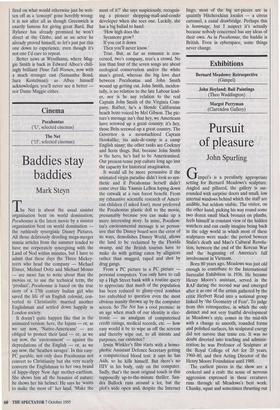Cinema
Pocahontas
('U', selected cinemas)
The Net ('15', selected cinemas)
Baddies stay baddies
Mark Steyn
he Net is about the usual sinister organisation bent on world domination; Pocahontas is the latest movie by a sinister organisation bent on world domination — the ruthlessly synergistic Disney Pictures. All those deliriously drooling mega-merger mania articles from the summer tended to have me corporately synergising with the Land of Nod within minutes, but I have to admit that these days the Three Mickey- teem who head the company — Michael Eisner, Michael Ovitz and Michael Mouse — are more fun to write about than the movies or, to use the technical term, the 'product'. Pocahontas is based on the true story of a 17th century Indian girl who saved the life of an English colonist, con- verted to Christianity, married another Englishman and settled down happily in London society.
It doesn't quite happen like that in the animated version: here, the Injuns — or, as we say now, Native-Americans' — are obliged to protect their land — or, as we say now, the 'environment' — against the depredations of the English — or, as we say now, the 'heathen savages'. In this easy- PC parable, not only does Pocahontas not convert to Christianity but she very nearly converts the Englishman to her own brand of hippy-dippy New Age mother-earthism. She shows him all the beauties of nature; he shows her his helmet. He says he 'wants to make the most of' her land. 'Make the most of it?' she says suspiciously, recognis- ing a pioneer shopping-mall-and-condo developer when she sees one. Luckily, she has a big ballad to hand: 'How high does the Sycamore grow?
If you cut it down Then you'll never know.'
True. But, as far as romance is con- cerned, two's company, tree's a crowd. No less than four of the seven songs are about ecological conservation and/or the white man's greed, whereas the big love duet between Pocahontas and John Smith wound up getting cut. John Smith, inciden- tally, is no relation to the late Labour lead- er, nor is he any relation to the real Captain John Smith of the Virginia Com- pany. Rather, he's a blonde Californian beach bozo voiced by Mel Gibson. The pic- ture's message isn't that hey, we Americans have screwed up a great country; it's hey, those Brits screwed up a great country. The Governor is a moustachioed Captain Hookalike; his aide-de-camp is a camp English ninny; the other ranks are Cockney and Scots thugs. But, because John Smith is the hero, he's had to be Americanised. Our present-tense pop culture long ago lest the capacity for historical imagination.
It would all be more persuasive if the animated virgin paradise didn't look so syn- thetic and if Pocahontas herself didn't come over like Yasmin LeBon loping down the catwalk at a rain forest benefit. From my exhaustive scientific research of Ameri- can children (I asked four), most preferred the Pocahontas plastic doll to the movie, presumably because you can make up a more interesting story. In mine, Pocahon- tas's environmental message is so persua- sive that the Disney board sees the error of its ways, demolishes Disney World, allows the land to be reclaimed by the Florida swamp, and the British tourists have to make do with getting eaten by alligators rather than mugged, raped and shot by drug gangs.
From a PC picture to a PC picture — personal computers. You only have to call up a High Street bank with a routine query to appreciate that much of the population has been reduced to glassy-eyed zombies too enfeebled to question even the most obvious inanity thrown up by the computer screen. So The Net has a cool premise: in an age when much of our identity is elec- tronic — an amalgam of computerised credit ratings, medical records, etc. — how easy would it be to wipe us off the screens and thereby wipe out, to all intents and purposes, our existence?
Irwin Winlder's film starts with a homo- phobic Assistant Defence Secretary getting a computerised blood test: it says he has Aids, so he kills himself. But there's no HIV in his body, only on the computer. Sadly, that's the most original touch in this supposedly up-to-the-minute thriller. San- dra Bullock runs around a lot, but the plot's wide open and, despite the Internet lingo, most of the big set-pieces are in quaintly Hitchcockian locales — a circus carousel, a canal drawbridge. Perhaps this is hommage, but I suspect it's actually because nobody concerned has any ideas of their own. As in Pocahontas, the baddie is British. Even in cyberspace, some things never change.










































































 Previous page
Previous page